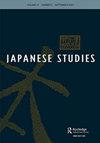Ideology and Libraries: California, Diplomacy, and Occupied Japan, 1945–1952
IF 0.4
Q3 AREA STUDIES
引用次数: 0
Abstract
burgeoning metropolises in Asia. An interesting area of discussion, for example, is women’s sexual pleasure in a ‘normal’ context that witnesses rampant sexual abuse while upholding masculinity and marriage as equally sacrosanct. Kotiswaran (2012), when describing advocacy movements in India that were helping sex workers’ struggles to be recognized as a labor force, uses a materialist argument that explores how endemic sexual violence propels vulnerable women into abandoning false morality, and embracing sex work. Charging money for sex, instead of it being extorted out of them in lieu of money, vulnerable women work in terms of a deficit model, transforming sex into an exchange currency, that accords them freedom, sexual safety, sexual pleasure, and dignity, simply by alleviating their poverty, and reducing the looming specter of constant sexual violence. While Koch discusses women’s disappointment with the employment sector in Japan, while also describing how sex turns violent; the Indian case stands in contrast, pointing to the additional variable of pleasure and safety, that influences women’s commitment to work and advocacy. It is instructive that a sexually violent society where the trafficking of women is high, in addition to a male dominated workforce, produces sex work as healing for women, who make the choice to enter, or remain within the industry. It is therefore possible in the Japanese context, that the sex work industry conceals narratives of feminine pleasure, autonomy, dignity, safety, and affluence, that both produces and subverts a masculine, gendered economy.《意识形态与图书馆:加州、外交和被占领的日本,1945-1952
亚洲新兴的大都市例如,一个有趣的讨论领域是女性在“正常”背景下的性快感,在这种背景下,女性目睹了猖獗的性虐待,同时又坚持男性气概和婚姻同样神圣不可侵犯。Kotiswaran(2012)在描述印度帮助性工作者争取被承认为劳动力的倡导运动时,使用了唯物主义的论点,探讨了普遍存在的性暴力如何推动弱势妇女放弃虚假道德,并接受性工作。对性行为收取费用,而不是以金钱的形式被勒索,弱势妇女以赤字模式工作,将性变成一种交换货币,通过减轻她们的贫困,减少不断出现的性暴力的阴影,使她们获得自由、性安全、性快乐和尊严。虽然科赫讨论了日本女性对就业部门的失望,同时也描述了性是如何变成暴力的;印度的情况则相反,它指出了影响妇女对工作和宣传的承诺的额外变量,即快乐和安全。在一个性暴力的社会中,贩卖妇女的现象很高,加上男性占主导地位的劳动力,因此产生了性工作,作为妇女的治疗方法,这些妇女选择进入或留在这个行业,这是很有启发意义的。因此,在日本的背景下,性工作行业有可能隐藏着女性快乐、自主、尊严、安全和富裕的叙事,这些叙事既产生又颠覆了男性化的、性别化的经济。
本文章由计算机程序翻译,如有差异,请以英文原文为准。
求助全文
约1分钟内获得全文
求助全文

 求助内容:
求助内容: 应助结果提醒方式:
应助结果提醒方式:


